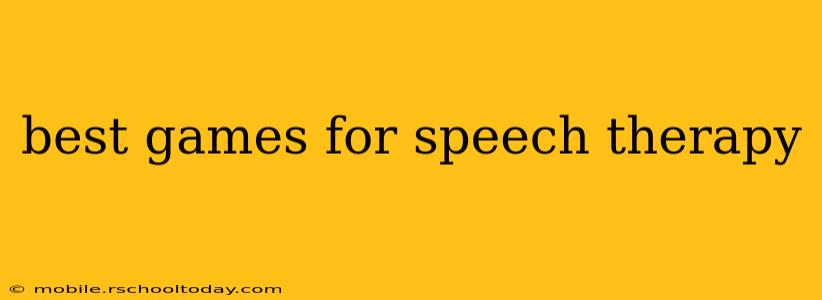Speech therapy can be challenging, but it doesn't have to be boring! Many engaging games can help children and adults improve their communication skills. The best games are those that are fun, motivating, and tailored to the individual's specific speech needs. This article explores various game categories and provides examples to help you find the perfect fit.
What Makes a Game Good for Speech Therapy?
Before diving into specific games, let's discuss the key characteristics of effective speech therapy games:
- Targeted Skills: The game should directly address specific speech goals, such as articulation, fluency, language comprehension, or social communication.
- Engaging Gameplay: Fun and interactive elements keep individuals motivated and encourage participation.
- Appropriate Difficulty: The game's complexity should match the individual's abilities, gradually increasing in challenge as skills improve.
- Flexibility: Games should be adaptable to different skill levels and individual needs.
- Positive Reinforcement: Positive feedback and rewards maintain motivation and celebrate progress.
Types of Games for Different Speech Goals
Articulation Games: Focusing on Clear Pronunciation
Many games can improve articulation. These games often focus on practicing specific sounds or sound combinations.
- Sound Bingo: Create bingo cards with pictures representing words containing the target sound. Call out the words, and players mark them on their cards.
- I Spy with My Little Eye: A classic game adapted for speech therapy. The player describes an object using words containing the target sound.
- Articulation Board Games: Numerous commercially available board games incorporate articulation practice within the gameplay.
Fluency Games: Improving Speech Flow and Reducing Stuttering
Games that emphasize smooth and rhythmic speech are beneficial for fluency.
- Rhythm Games: Activities involving clapping, tapping, or using musical instruments can help improve rhythm and timing in speech.
- Storytelling Games: Collaborative storytelling helps individuals practice smooth speech within a natural context. Take turns adding sentences to a shared story.
- Reading Aloud Games: Reading aloud with a partner can provide a supportive environment to improve fluency.
Language Comprehension Games: Boosting Understanding and Vocabulary
These games help strengthen the ability to understand and use language effectively.
- Category Games: Players name items within a specific category (e.g., animals, colors, foods). This strengthens vocabulary and categorization skills.
- Following Directions Games: Simple games involving following multi-step instructions improve comprehension skills.
- Picture Matching Games: Matching pictures to words enhances vocabulary and comprehension.
Social Communication Games: Developing Conversational Skills and Social Interaction
Social communication games are crucial for improving interaction and communication in social settings.
- Role-Playing Games: Acting out different social scenarios helps individuals practice appropriate communication behaviors in various situations.
- Card Games: Many card games, such as "Go Fish" or "Uno," naturally encourage communication and turn-taking.
- Conversation Starters: Use picture cards or conversation prompts to initiate discussions and practice initiating and maintaining conversations.
Finding the Right Games for Your Needs
The best games for speech therapy depend on the individual's age, specific speech challenges, and personal preferences. Consider these factors when selecting games:
Age Appropriateness: Select games with age-appropriate themes, rules, and complexity.
Individual Goals: Focus on games targeting the specific speech goals identified by the speech-language pathologist.
Motivation and Engagement: Choose games that are fun and enjoyable for the individual, ensuring they remain motivated to participate.
Accessibility: Ensure the game materials are accessible and easy to use.
Professional Guidance: Consult with a speech-language pathologist for personalized recommendations and guidance on game selection and implementation.
Frequently Asked Questions
What are some free games I can use for speech therapy?
Many simple games can be adapted for speech therapy without any cost. For example, using household items to create your own bingo cards or adapting classic games like "I Spy" or "Simon Says." Online resources also offer free printable materials and activity ideas.
How can I make games more engaging for speech therapy?
Incorporate elements like rewards, positive reinforcement, and collaboration. Allow the individual to choose games, and vary activities to maintain interest. Adjust difficulty levels as skills improve.
Are there apps that can help with speech therapy games?
Yes, many apps offer speech therapy games targeting various skills. However, remember that apps should supplement, not replace, professional therapy. Always consult with a speech-language pathologist before using any app for speech therapy.
By employing a variety of engaging games tailored to individual needs, speech therapy can become a fun and rewarding experience that helps individuals reach their full communication potential. Remember that consistency and positive reinforcement are key to success.
